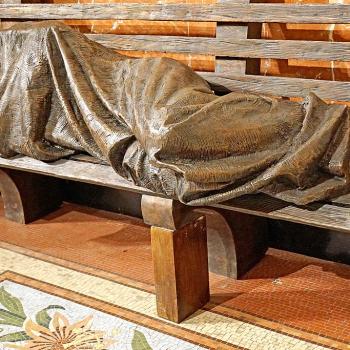
Life is a sacred gift given by God. The Lord of life, God, has indicated several times that we are respect life, all life:
God proclaims that he is absolute Lord of the life of man, who is formed in his image and likeness (cf. Gen 1:26-28). Human life is thus given a sacred and inviolable character, which reflects the inviolability of the Creator himself. Precisely for this reason God will severely judge every violation of the commandment “You shall not kill”, the commandment which is at the basis of all life together in society. He is the “goel”, the defender of the innocent (cf. Gen 4:9-15; Is 41:14; Jer 50:34; Ps 19:14). God thus shows that he does not delight in the death of the living (cf. Wis 1:13). Only Satan can delight therein: for through his envy death entered the world (cf. Wis 2:24). He who is “a murderer from the beginning”, is also “a liar and the father of lies” (Jn 8:44). By deceiving man he leads him to projects of sin and death, making them appear as goals and fruits of life. [1]
All life is sacred; no matter who the person is, no matter what they have done, their life is precious and should be preserved due to its holy character:
Where life is involved, the service of charity must be profoundly consistent. It cannot tolerate bias and discrimination, for human life is sacred and inviolable at every stage and in every situation; it is an indivisible good. We need then to “show care” for all life and for the life of everyone. Indeed, at an even deeper level, we need to go to the very roots of life and love. [2]
Just as existence is good, so that the existence of pure evil is an impossibility (for such evil would contain the good of existence, making that evil impure), so life is good, and that goodness is inviolate. There must be no attempt to make a particular kind of life, or life at any particular stage of existence, to be superior to any other kind of life, or any other stage of existence. Those who do so show they do not recognize the inviolate nature of life; rather, they think particular kinds of life, particular stages of life are important, indeed, more important than others, making the value of life relative. This, of course, is not the position of those who hold life as sacred, for that position is one which shows concern for every human person:
As far as the right to life is concerned, every innocent human being is absolutely equal to all others. This equality is the basis of all authentic social relationships which, to be truly such, can only be founded on truth and justice, recognizing and protecting every man and woman as a person and not as an object to be used. Before the moral norm which prohibits the direct taking of the life of an innocent human being “there are no privileges or exceptions for anyone. It makes no difference whether one is the master of the world or the ‘poorest of the poor’ on the face of the earth. Before the demands of morality we are all absolutely equal”.[3]
St. John Paul II, in pointing out that every innocent human person is equal to every other innocent person, does not mean that the value of the lives those who are guilty of crimes, those who sin, has been lost so that their life can be taken from them. Life, even the lives of sinners, is of value, because it is life, and life is a gift of God. It is good; those who would seek to take it away from anyone turn away from God, and in doing so, embrace sin, making them no longer innocent themselves.
St. John Paul pointed to the growing awareness that the death penalty must be abolished: “This is the context in which to place the problem of the death penalty. On this matter there is a growing tendency, both in the Church and in civil society, to demand that it be applied in a very limited way or even that it be abolished completely.” [4] Further reflection upon the value of life, and its intrinsic good, has led Pope Francis to conclude: “Today we state clearly that ‘the death penalty is inadmissible’ and the Church is firmly committed to calling for its abolition worldwide.”[5] It is clear, this is done because life is sacred, and recognizing the sacredness of life requires us to recognize it in everyone, no matter what they have done; if we think we can act in such a way as to violate the sacred nature of life, so that it becomes acceptable for others to take our life away, we show we do not consider the value of life to be inviolate. Instead, we end up accepting the basic premise that all killers embrace, that is, life’s value is relative and can be taken away.
It is not just direct killing which must be stopped; indirect killing of others in ways which can be prevented should also be stopped, for if we fail to do what we can to preserve life, we are complicit in its loss. For example, if health care is needed in order to save a life, but that care is not given, even though it could be given, those who have worked to prevent that life-saving care are complicit in the death of the one who dies. They did not recognize the person’s life as sacred, as something to be preserved. Thus, if some work against the promotion of basic health care for all, they are working against life and, insofar as they help set up a system which allows people to needlessly die, they are complicit in the death of those people. Pope Benedict XVI, understanding this, specifically pointed out the need for justice to be had in and through the health care system:
In the health-care sector too, which is an integral part of everyone’s life and of the common good, it is important to establish a real distributive justice which, on the basis of objective needs, guarantees adequate care to all. Consequently, if it is not to become inhuman, the world of health care cannot disregard the moral rules that must govern it.[6]
Those who embrace life, those who truly value it, will seek to help those in need; indeed, they will see the example of the Good Samaritan in Scripture as indicative of how we should deal with those in need:
It is difficult to list here all the types and different circumstances of “Good Samaritan” work which exist in the Church and society. It must be recognized that they are very numerous, and one must express satisfaction at the fact that, thanks to them, the fundamental moral values, such as the value of human solidarity, the value of Christian love of neighbour, form the framework of social life and interhuman relationships and combat on this front the various forms of hatred, violence, cruelty, contempt for others, or simple “insensitivity”, in other words, indifference towards one’s neighbour and his sufferings. [7]
Because the poor and needy, those who are outcast and oppressed, are the ones who most often have the value of their lives reduced, they are the ones who Jesus, and Scripture, shows we must give preference to. They are the ones who are most likely to be mistreated, to have their lives viewed as worthless. Recognizing the holiness of all life, we must reach out to them and lift them up so that their life can be treated accordingly. Jesus, after all, reached out to them for this reason:
It is above all the “poor” to whom Jesus speaks in his preaching and actions. The crowds of the sick and the outcasts who follow him and seek him out (cf. Mt 4:23-25) find in his words and actions a revelation of the great value of their lives and of how their hope of salvation is well-founded. [8]
This, then, is what it means to be pro-life: to promote the dignity of all life, to work for and help those in need, indeed, to work for distributive justice so that those who have been mistreated or ignored, and so most likely to needlessly die because of systematic structures of sin, not only will be able to live, but thrive, so that the dignity of their life can be affirmed.
However, this is not what we see with so many people who claim to be pro-life. Instead, we see the pro-life mantle to be used as an ideology for the sake of a few people, not all, and in the embrace of those few, all others can be sacrificed. Those who are pro-life for a few end up willing to kill for the sake of those few, either directly, such as with those who embrace the death penalty, or indirectly, as with those who oppose social justice and the preferential option for the poor. This is what we see, for example, around the Trump Administration and its supporters, especially by those who are politically “pro-life.” They call President Trump the “most pro-life president of all time.” They not only embrace Trump, they embrace his agenda, an agenda which can be seen to be far from life-affirming. It is bloodthirsty. The Department of Justice, under Trump, not only has embraced the death penalty, it has embraced and promoted cruel forms of execution, such as the use of a firing squad to execute prisoners. Realizing that these changes will likely not last when Biden comes into office, Trump and the Department of Justice are trying to execute as many people as possible, ignoring relevant questions concerning the culpability of those they execute (let alone whether or not it is just to kill a criminal, if they are indeed culpable for the crime). The Attorney General, a Catholic who claims to be pro-life, is fully behind these actions, demonstrating how the political vision of what it means to be pro-life is far from the religious vision, as it is willing to embrace death as a means to enforce its vision of the world.
Likewise, Trump, so pro-life, is working hard to make sure the poor and needy do not have the resources they need to survive. From attacks on health care, to taking away access to food for those in need during a pandemic, the Trump Administration shows that only the life of some are considered valuable and worth saving. This can also be seen in the way the administration, and many following it, have treated the pandemic, telling the poor, the elderly, and many others that they need to risk their lives for the sake of the rich, so that the economy can thrive while the rich keep themselves safely away from harm. This can also be demonstrated by the way the administration treats the environment; for the sake of our future, we need to take care of the earth and all that happens on it, not mistreat it but recognize our place on it and that what happens to it will affect us. We will die, we will perish, if the environment is abused. Instead of being concerned about the way environmental abuse affects humanity, and leads to many needless deaths, Trump is reckless, overturning regulations which keep us safe and alive. He doesn’t care; it won’t affect him – he thinks he is safe, so he is willing to let others suffer the consequences of his policies, which is exactly what we should expect of the man who willingly holds super-spreader coronavirus events for the sake of his pride.
It is not just Trump. It is those who follow him. The same ones who claim he is pro-life, also claim to be pro-life but yet are more than willing to promote death. From Rick Wiles, who suggested Democrats and members of the media should be put up to a firing squad, to Republican Officials in Arizona urging people to sacrifice their lives for the sake of Trump, we find so-called pro-life politicians and their supporters have a hierarchy of value, a hierarchy of life, in which some life is important and others. They prove themselves to be so pro-life for a few, that anyone else doesn’t matter. They are willing to have people die, or even killed, for the sake of the “pro-life” political cause.
In this fashion, many of those call themselves pro-life have turned the promotion of life upside-down, and inverted it, as they show themselves favoring the life of a few, saying only a few people deserve to have their lives protected and saved. Everyone else’s life is of relative value. If it must be sacrificed for those in power, for those with wealth, so be it. Politically, the pro-life position has come to this. This is why so many who call themselves pro-life have no qualms with killing others, discriminating against others, forcing others to suffer so long as their own lives are not threatened. This is far from what is expected of the Christian, and why Christians should remove themselves from those who hold such an ideology. They must look to the world with the eyes of God, the eyes which love all, even sinners, seeking to save and preserve the life of all, especially those who are otherwise treated as unworthy of life. They will look to the parable of the Good Samaritan and learn what it teaches:
Following the parable of the Gospel, we could say that suffering, which is present under so many different forms in our human world, is also present in order to unleash love in the human person, that unselfish gift of one’s “I” on behalf of other people, especially those who suffer. The world of human suffering unceasingly calls for, so to speak, another world: the world of human love; and in a certain sense man owes to suffering that unselfish love which stirs in his heart and actions. The person who is a ” neighbour” cannot indifferently pass by the suffering of another: this in the name of fundamental human solidarity, still more in the name of love of neighbour. He must “stop”, “sympathize”, just like the Samaritan of the Gospel parable. The parable in itself expresses a deeply Christian truth, but one that at the same time is very universally human. It is not without reason that, also in ordinary speech, any activity on behalf of the suffering and needy is called “Good Samaritan” work.[9]
To truly be pro-life is to work especially for those in need, those who are poor and oppressed, and to overturn the structures of sin which have put undue burdens on those whose lives have been deemed worthless by those in authority. It requires us to fight against those who take proclaim themselves to be pro-life while they show themselves to be concerned about power and glory instead of life. But this is not what we see in the political scene. What we see in politics is that those who claim to be pro-life create slogans to get followers while they embrace power for themselves. What they do in office is not just nominal, it is circumvented by the policies they embrace as they pit life against life, making some forms of life viewed as worth protecting, and others not. Those who are deemed worthless can be and will be killed (directly or indirectly) for the sake of their true desires, desires which have nothing to do with life itself. For what they want, what they promote, is not the dignity of life, a dignity which will seek to have everyone not only live, but to have a quality life, but rather, they seek their own interests, interests which have nothing to do with life but everything to do with what they can get for themselves. This is why, politically, the pro-life lobby is anything but life, because their interests are not for the dignity and support of all life, and this is also why Christians, seeking to truly be pro-life cannot and must not support such a false presentation of the pro-life position. For if they do so, they will prove that they, like so many others, end up being so pro-life, they are willing to kill for their political ideology as well.
[1] Pope St. John Paul II, Evangelium Vitae. Vatican translation. ¶53.
[2] Pope St. John Paul II, Evangelium Vitae, ¶87.
[3] Pope St. John Paul II, Evangelium Vitae, 57.
[4] Pope St. John Paul II, Evangelium Vitae, 56.
[5] Pope Francis, Fratelli tutti. Vatican translation. ¶263.
[6] Pope Benedict XVI, “Message to the Participants in the 25th International Conference Organized By the Pontifical Council For Health Care Workers.” Vatican translation.
[7] Pope St. John Paul II, Salvifici Doloris. Vatican translation. ¶29.
[8] Pope St. John Paul II, Evangelium Vitae, ¶32.
[9] Pope St. John Paul II, Salvifici Doloris. Vatican translation. ¶29.
Stay in touch! Like A Little Bit of Nothing on Facebook.
If you liked what you read, please consider sharing it with your friends and family!















